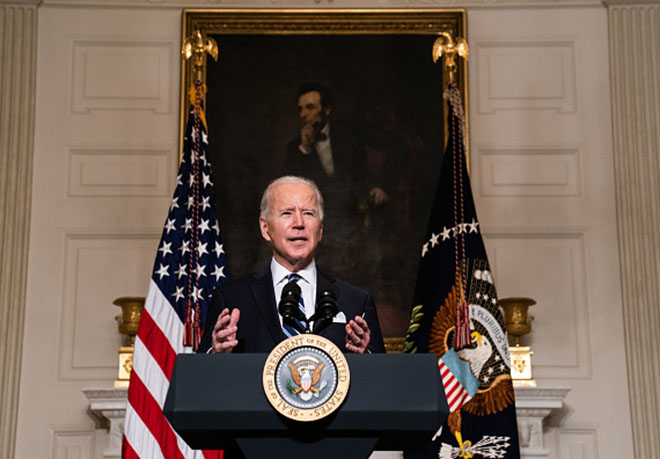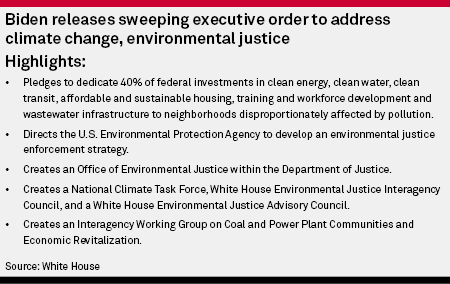Featured Topics
Featured Products
Events
S&P Global Offerings
Featured Topics
Featured Products
Events
S&P Global Offerings
Featured Topics
Featured Products
Events
S&P Global Offerings
Featured Topics
Featured Products
Events
Financial and Market intelligence
Fundamental & Alternative Datasets
Government & Defense
Professional Services
Banking & Capital Markets
Economy & Finance
Energy Transition & Sustainability
Technology & Innovation
Podcasts & Newsletters
Financial and Market intelligence
Fundamental & Alternative Datasets
Government & Defense
Professional Services
Banking & Capital Markets
Economy & Finance
Energy Transition & Sustainability
Technology & Innovation
Podcasts & Newsletters
29 Jan, 2021

|
Before signing an executive order on climate change Jan. 27, U.S. President Joe Biden explained that addressing social issues such as environmental justice and ensuring a just transition for fossil fuel workers are key to his climate agenda. |
Any successful plan to combat climate change needs to address both environmental and social concerns, according to remarks this week from both the new U.S. President and the head of the world's largest asset manager.
Addressing environmental justice and ensuring a just transition for fossil-fuel industry workers are necessary steps to achieve deep decarbonization and an equitable economic recovery, President Joe Biden said in a speech Jan. 27 before signing an executive order on climate change.
A day earlier, BlackRock Inc. CEO Larry Fink released his much-anticipated annual letter calling on companies to address both social equity and climate change. For climate change, "a successful transition — one that is just, equitable, and protects people's livelihoods — will require both technological innovation and planning over decades," he wrote. Moreover, Fink wrote, "vulnerable communities and developing nations, many of them already exposed to the worst physical impacts of climate change, can least afford the economic shocks of a poorly implemented transition. We must implement it in a way that delivers the urgent change that is needed without worsening this dual burden."
 |
"It's hard to measure what you're doing on the 'S' side of ESG versus what you're doing on the sustainability side, because they intersect," Fink said at the virtual Davos conference hosted by the World Economic Forum. "Companies that are focusing on everything are the leading companies in each industry."During a panel discussion Jan. 26, Fink also asserted that companies addressing ESG in a holistic way will outperform those that don't.
BlackRock is the world's largest asset manager, with $8.677 trillion in assets under management, and Fink's words make waves throughout the investment world. Some energy companies, too, are taking steps to embrace the interconnected nature of environmental and social challenges. Duke Energy Corp. CEO Lynn Good recently announced that her company is developing principles for environmental justice to help get buy-in from local communities when building out its infrastructure and working to meet a goal of net-zero emissions by 2050. Duke is one of the largest electric utilities in the U.S.
Seeking private sector buy-in and international collaboration
Biden's climate agenda is ambitious, with goals to reach net-zero emissions by 2050 and achieve zero-carbon electricity by 2035. To succeed, he will need private sector buy-in and lawmaker support, said Special Presidential Envoy for Climate John Kerry in a press briefing this week.
Despite four years of a Trump administration that moved to unwind environmental regulations, the clean energy transition is already underway. Kerry noted that in recent years, states and the private sector have rapidly increased investments in wind and solar, the kinds of projects that will be needed to achieve the new administration's goals.
 |
Biden is also seeking to re-engage with international peers on climate. Kerry asserted that the signals the Biden administration is sending early in its term, including by rejoining the Paris agreement on climate change, engaging with the business community and directing federal agencies to procure carbon-free electricity and switch to zero-emission vehicles, will put the nation on a sustainable long-term trajectory.
Kerry pointed to Fink's letter calling on companies to start planning for a net-zero economy as evidence that the financial community is already on board with these goals.
"We can achieve things in the course of the next four years that will move in the marketplace, the private sector, global finance, innovation and research," Kerry said. "No one, no political person in the future will be able to undo what the planet is going to be organizing over these next months and years."
As for rallying global action around climate change, Biden plans to convene a summit of world leaders on April 22, Earth Day. His administration aims to formally submit its decarbonization pledge under the Paris accord on or before that date, Kerry said.
Carrying out a key campaign pledge to prioritize environmental justice
With his actions this week, Biden follows through on a campaign pledge to make environmental justice a key part of his climate plan and to pursue a just transition for workers. He created a National Climate Task Force as well as White House interagency and advisory councils on environmental justice.
Biden also created an Interagency Working Group on Coal and Power Plant Communities and Economic Revitalization. The goal of the group is to ensure that communities that have been dependent on fossil-fuel jobs and related tax revenues will not be left behind as the nation transitions to a low-carbon economy.
Biden identified some of those communities in his speech Jan. 27, highlighting in particular the industrial corridor along the Mississippi River between Baton Rouge and New Orleans known as "cancer alley" for its extremely high pollution levels that have been linked to an unusually high rate of cancer and other respiratory ailments in surrounding communities.
 |
"Environmental justice will be at the center of all we do, addressing the disproportionate health and environmental and economic impacts on communities of color, so-called fence-line communities, especially those communities — Brown, Black, Native American and poor Whites — the hard-hit areas like cancer alley in Louisiana," Biden said.
In addition, Biden in the executive order formalized his goal of dedicating 40% of federal investments in clean energy, clean water and wastewater infrastructure to neighborhoods that have been disproportionately affected by pollution. The president explained that addressing these social and environmental issues is essential to rebuilding the U.S. economy after the COVID-19 pandemic.
"Lifting up these communities makes us all stronger as a nation and increases the health of everybody," he said.
The day after Biden issued his executive order, Democratic lawmakers Sen. Ed Markey of Massachusetts, Sen. Tammy Duckworth of Illinois and Rep. Cori Bush of Missouri introduced legislation to create a database of information that could help identify which communities experience environmental injustices. Markey in a press call said the data would help the Biden administration ensure 40% of federal infrastructure investments are going to the right communities.
"This is an opportunity to bring decision making power into frontline communities ... for solutions for this crisis," Markey said.
What a 'just transition' means, and why it matters
Biden's plan also includes a promise to assist communities that have been dependent on fossil fuels in decades past for jobs and tax revenues.
"It's no time for small measures," Biden said. "We need to be bold, so let me be clear, that includes helping revitalize the economies of coal, oil and gas and power plant communities. ... We're going to do right by them, make sure they have opportunities to keep building the nation in their own communities and getting paid well for it."
A number of investors and economic experts, including Aseem Prakash, founding director of the Seattle-based University of Washington Center for Environmental Politics, have suggested that attempts to tackle the climate crisis must address the concerns of communities in the Rust Belt that view climate change as a threat to their financial future.
Josh Zinner, CEO of the Interfaith Center on Corporate Responsibility, an international coalition of institutional investors that engages with corporations on a wide range of ESG issues, in a recent interview said that the main concern of those communities is the loss of high-paying unionized jobs, such as in the gas industry.
Listen to the ESG Insider podcast on SoundCloud, Spotify and Apple podcasts.
In contrast, many renewables jobs have not been unionized and pay less, he said. "Ensuring that there are living-wage union jobs in the renewable sector so that sectors that are being replaced are being replaced by sectors where there is fair pay and the opportunity to organize, that's really critical towards a just transition," said Zinner.
Seemingly aware of this dynamic, Biden and his top climate advisers emphasized that they expect to find a role in the climate plan for former fossil-fuel industry employees.
"A key plank of our Build Back Better Recovery Plan is building a modern, resilient climate infrastructure and clean energy future that will create millions of good-paying union jobs — not $7, $8, $10, $12 an hour, but prevailing wage and benefits," said Biden. He said millions of Americans can have jobs working on modernizing water systems, transportation, and energy infrastructure to withstand the impacts of climate change.
Biden also suggested that his directive to federal agencies to procure carbon-free electricity, buy American-made products, and switch to zero-emission vehicles, can produce 1 million jobs in the auto manufacturing industry. And he said another 500,000 jobs will be created to do things like plugging millions of abandoned oil and gas wells.
"Today is 'Climate Day' at the White House which means that today is 'Jobs Day' at the White House," Biden said. "We're talking about American innovation, American products, American labor. And we're talking about the health of our families and cleaner water, cleaner air and cleaner communities. We're talking about national security and America leading the world in a clean energy future."
